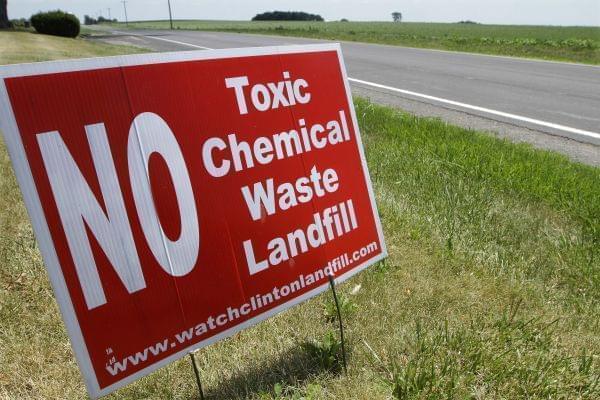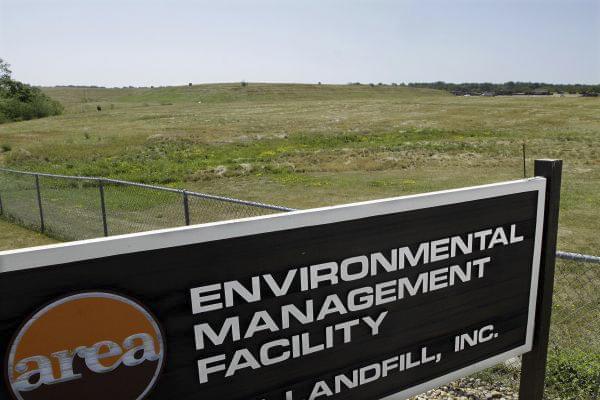Clinton Landfill Settlement Leads To Questions On Future Of Aquifer Underneath

A sign in DeWitt County protesting the placing of PCB's in Clinton Landfill. Sean Powers/Illinois Public Media
Over the last few weeks, we’ve reported on the Clinton Landfill Consent Decree. It’s an agreement between the owners of the Clinton Landfill in DeWitt County, and a coalition of local governments. And once it’s approved in court, it will limit what materials can go into the landfill, in order to protect the Mahomet Aquifer that lies beneath it.
Both supporters and critics of the Consent Decree say it shouldn’t be the final word on the issue.
The Mahomet Aquifer Coalition is made up of the governments of Champaign, Urbana, Bloomington, Normal, Decatur, Monticello, Tuscola, Forsyth and Savoy; Champaign, Piatt, McLean and Macon Counties and the Mahomet Valley Water Authority. The Clinton Landfill Consent Decree won approval from each of them over the course of September and October.
When it came time for the Champaign County Board to vote on the issue at a special meeting on September 29th, Vice-Chairman Jeff Kibler thought of the future. Facing one of his last votes before his resignation from the county board to devote more time to his job, the Champaign Republican wondered what his children might think, if the Consent Decree turned out to be inadequate.
“They’re going to have to come to their dad and say, ‘In your second-to-last vote on the county board, you allowed for this now-leaking thing into the Mahomet Aquifer that basically contaminated it. Why did you vote yes?’” said Kibler. “And I’m going to have to say, ‘Well, that’s the best we could do’. But is it really?”
Kibler voted "no", but backers of the Consent Decree say it is the best they could do. Under its terms, the 14-government Mahomet Aquifer Coalition is getting guarantees from the Clinton Landfill that it will give up its efforts to take in toxic PCB waste, and stop taking in manufactured gas plant waste. In return, the Coalition drops their state Pollution Control Board complaint against the Clinton Landfill. And the landfill gets to keep the gas plant waste it already has, although it must add extra safeguards.

The entrance to the Clinton Landfill is seen, near Clinton, Ill. on June 20, 2012.
Consent Decree Supporters, like former Champaign City Manager Steve Carter, say that’s why area officials now need to look at other ways to protect the aquifer.
“And I think that’s our challenge moving forward,” said Carter. “If we can’t come up with a good plan to sustain it over many, many years, you know, at some point, our aquifer will be compromised.”
Carter spoke at a September 19th public meeting on the Mahomet Aquifer in Champaign. And he had a few suggestions --- new state laws that ban new or expanded landfills, outside monitoring of the Clinton Landfill, and encouraging alternative methods of disposing of waste other than landfills.
And at the Champaign County Board meeting, board member Gary Maxwell of Mahomet made a proposal that he said might sound unusual coming from a Republican.
“We’re going to have to lay some sort of a water authority all over this aquifer,” said Maxwell. “And it’s going to mean another level of government that we’re not going to like. But it’s the only way I know to actually provide the drinking water that we’re going to need for our citizens, and (an) ample supply of water for industry so that we can have a vibrant economy.”
Critics of the Consent Decree are also looking ahead. They feel the governments involved are making a mistake, by allowing manufactured gas plant waste to stay in the landfill, and giving up future rights to take legal action on the matter.
Some critics suspect the Clinton Landfill of taking construction shortcuts. And all of them believe the landfill is bound to leak someday, citing a federal Environmental Protection Agency document that argues from the same assumption.
That belief and fears that the Consent Decree would close a door for possible action to protect the aquifer was behind the group W.A.T.C.H Clinton Landfill’s decision last month to file its own lawsuit against the landfill in DeWitt County Circuit Court. Bill Spencer is the group’s president.
“The landfill is located over a Sole Source Aquifer, which requires certain protections to be able to have waste there,” said Spencer. “And those precautions have never been put in place to protect the aquifer. So there’s nothing that can be done at this point, other than to clean it up and move it.
The Mahomet Aquifer was named a Sole Source Aquifer by the federal Environmental Protection Agency earlier this year, which means landfills wanting to build over the aquifer will face more regulatory scrutiny. Backers of the Consent Decree say it was likely a factor in the landfill owner’s decision to seek a settlement.
But the W.A.T.C.H lawsuit contends that under state regulations regarding landfills near Sole Source aquifers, the only good settlement is for the Clinton Landfill to close and its waste to be moved somewhere else.
But the vice-president and chief operating officer for the Clinton Landfill questions where the waste in the Clinton Landfill would go. Chris Coulter says a landfill anywhere in Illinois is likely to be located above an aquifer.
“One aquifer isn’t more important than another aquifer; they’re all equally important,” said Coulter. His family owns the Coulter Companies, which owns the Clinton Landfill and other landfills in central Illinois, and the Peoria Disposal and Area Disposal companies.
As Coulter sees it, landfills like his are better places for waste than the places they came from. He says that much of the manufactured gas plant waste in the Clinton Landfill came from an industrial site in downtown Clinton, with no evidence that it contaminated the aquifer from there. Coulter argues that under the Consent Decree, his landfill will have more than enough protections built in to safeguard the water supply.
“Most landfills, EPA standards require about 50 feet of clay,” said Coulter. “We have over 150 feet of clay. We have over three times that. We feel very confident that nothing will ever happen to the Mahomet Aquifer, with Clinton Landfill.”
In fact, Coulter predicts that new federal regulations for waste stored at coal-fired power plants mean more of those plants will be sending their coal ash to landfills --- like the one in Clinton. A ban on coal ash in landfills is one of the things on the to-do list of both backers and critics of the Consent Decree.
Links
- One Suit Against Clinton Landfill All But Settled, While Local Group Files New Lawsuit
- Macon County Board Approves Clinton Landfill Consent Decree
- Champaign County Board Approves Clinton Landfill Consent Decree
- Savoy Trustees Approve Clinton Landfill Consent Decree
- Urbana, Forsyth Approve Clinton Landfill Consent Decree
- UPDATED: Champaign City Council Endorses Clinton Landfill Consent Decree
- Clinton Landfill at PDC/Area Disposal website
- W.A.T.C.H. Clinton Landfill website
- Mahomet Aquifer page at Illinois State Water Survey website

